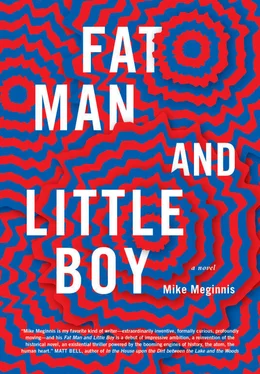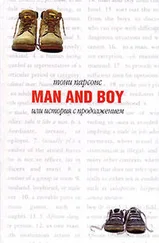He can’t remember. The guilt is beyond him when he forgets who he is. When he remembers, it’s the forgetting that escapes him.
The chocolate factory smells the same in both states. He knows that much for sure.
Fat Man finds Rosie in the library, in tears. She is searching a German dictionary. Fat Man rubs her back. He gently touches his knuckles to her cheek. He asks her what’s wrong.
“Nothing.”
“Then why are you crying?”
“I can’t find the words.” She breathes shallow.
He puts his hand on her stomach, trying to slow her. He says, “What words do you need?”
“The words I need to tell you what’s happened. I talk each day about the importance of knowing several languages and when it counts I only have the one.”
“What do you need to tell me?”
“You’re going to be a father,” says Rosie, closing the dictionary. “Ein papa.”
Fat Man leaves the library. He walks faster than he knew he could, his thighs swishing with each step. After a moment’s hesitation, Rosie follows him out. She catches up quickly.
“You said you were barren,” says Fat Man.
“These things happen. You should comfort me. I’m the mama.”
“You should comfort me,” shouts Fat Man. “You’ve had how long to adjust? Days? You just told me. I’ve never seen myself as a father.”
“You’re practically a father to Matthew.”
“He’s always been more of a brother to me.”
“What a strange thing to say.”
“Rosie, are you sure?”
“The doctor is quite sure.”
They hold each other.
Rosie says, “I don’t believe in abortion.”
“Of course not,” says Fat Man. “Of course not.”
They marry. Fat Man asks her often before, during, and after the ceremony if she’s sure she wants to be with a lout like him. “It’s the risk I took,” she says one time, “sleeping with you like a child.” Another time she says, “I can put up with you if you can put up with me.” Another time she says, “Just don’t go off to any wars.” Another time she says, “You’re not so bad.” And another time, “You make me laugh.” And another time, “You’re beautiful.” And another time, “Okay, you’re ugly, but in a way I find beautiful.” And another time, “Not if you keep asking me.” And another time, “For God’s sake yes, you dumb son of a bitch, I love you more than anything. This is really, honestly, truly, and actually, exactly what I want.”
He moves out of the cabin he shares with Little Boy. Little Boy sleeps alone. He lives alone, though they often take their meals together, along with the rest of the hotel community. Little Boy keeps his cabin clean. He is so well-behaved now it makes his brother nervous. He is supposed to be seventeen. He looks the same as ever. Younger, even. More innocent. More rosy in the cheeks. Actually and truly happier, perhaps, though he never speaks unless he has to.
At night, Fat Man dreams of his child to come. Nightmares, all of them. In one his son is born with a black iron shell. The son can’t move, but stands a statue in the shape of a boy, arms raised to flex biceps. In another, Rosie births a bomb like Fat Man, a little one, along with several gallons of a black sludge like crude oil. The bomb rolls over several times, each time with a heavy clank. It does not explode, but lies smoking, quiet and still, an evil egg. In another dream, Rosie births rot. It comes out of her in colored smoke, or a gas lit from inside, red and yellow, green and blue, and the warmth between her legs collapses, becoming a space, and it spreads to her inner thighs, her pubis, her stomach, and she slowly collapses, the flesh rippling, dimpling, and staining with the rot colors, becoming a void.
He asks Little Boy what it would be to be a half-boy, half-bomb.
Little Boy says, “What?”
Marshal Philippe Pétain dies on an island somewhere. He was so old. They say that by the end his memory had left him so he didn’t even know what Vichy was. He might have thought that he was on vacation. He might have thought he’d always lived on that island.
Rosie comes home with a bust. She walks into their cabin with it balanced on her big baby gut, between her breasts. For a moment Fat Man thinks he’s gained what Little Boy took from Masumi—he thinks he sees a ghost, a victim of the guillotine. The white of the bust’s skin seems to glow in the night. The blank eyes accept his stare.
Rosie says, “I thought we should have one. Everybody else does.”
“We’ll have to paint his face,” says Fat Man.
“I thought we might leave him like this.”
“I don’t know how I feel about the old man.”
“I think he meant well, apart from what he did to the Jews.”
“That’s some exception,” says Fat Man.
“Everybody had camps,” says Rosie. “He was old and afraid.”
“Keep him off our baby at least. He’s a bad influence. And keep him away from me as well. He was a very bad father.”
They go to bed.
A nightmare wakes him. He sits at the table, arms folded underneath his chin, eyes level with the bust’s. “They’re coming for me next,” says Fat Man. “Thank God. I hope they put me on an island.”
The bust is like the moon.
The moon is outside. He can only see the rim.
The rim is like a zero. A zero’s something like a number, but it’s not—not really.
Like Fat Man is no kind of man, no kind of father.
Fat Man takes Little Boy for a ride in the car. He says they’re going to the doctor. Little Boy says he doesn’t want to. He says he’ll run away if Fat Man tries to take him to the doctor. Fat Man lifts Little Boy on his shoulder like a bale of hay. He throws him in the backseat of the car. They drive away.
Once they’ve left the hotel grounds, Fat Man says, “I’m not taking you to the doctor.”
“What?” says Little Boy.
“But when we get back, we have to say you went.”
“Fine.”
The car bumps along. Little Boy says, “Then where are we going?”
“The movies,” says Fat Man. “There’s a new Able and Baker picture I want to see.”
“Then what’ll we do?”
“We’ll go back home,” says Fat Man. “We’ll tell Rosie she was right. The doctor diagnosed you with a rare form of dwarfism. He says it’s not hereditary, though. That way she won’t worry anymore if there’s something I’m passing on to the baby.”
“Is there something you’re passing on to the baby?”
“Damned if I know. But you’re a dwarf now. Got it?”
“But I’m just a little boy. That’s all.”
“I know it,” says Fat Man. “But you really should be growing. That’s what little boys do.”
Little Boy sulks.
They see the Able and Baker film. This one is a romantic comedy. The filmmakers play with the twins’ reputation by making them portray two characters, two men who compete for the same woman’s love: two identical twins separated at birth, adopted by very different families, living very different lives, in total ignorance of each other’s existence. The woman they’re competing over is a secretary. One of them is her boss. The other’s a tough, sleazy mobster. The roles are credited to the brothers collectively, so that it’s impossible to say which is which, or if perhaps they trade between scenes. The boss is cool, calm, collected, and responsible, but perhaps a little too stern. He never smiles, though his eyes do sparkle, and when he tilts his head a certain way—well, he must be something like happy. The mobster is a hothead, constantly angry, ready to explode. But he’s passionate as well. He and the secretary share some kind of kiss. He lets her see him cry, and he’s beautiful when he cries, really gorgeous. So the secretary has to choose, and it’s difficult because each man speaks to a different side of her. She begins to diverge as a character in the movie’s second act, becoming two women. The boss’s loyal helpmate and the gangster’s partner in crime. In a dress appropriate to the office and a fine scarf, she helps the boss navigate a meeting in a client’s home, with all its social complications. In a too-short skirt and half-open blouse, she helps the tough steal several tins of caviar for a dinner at home. But eventually she’s got to choose.
Читать дальше












